Date: Thu, 8 Sep 2016 18:18:12 +0200
S. Sudan Opposition Dismisses US Position on Machar's Return
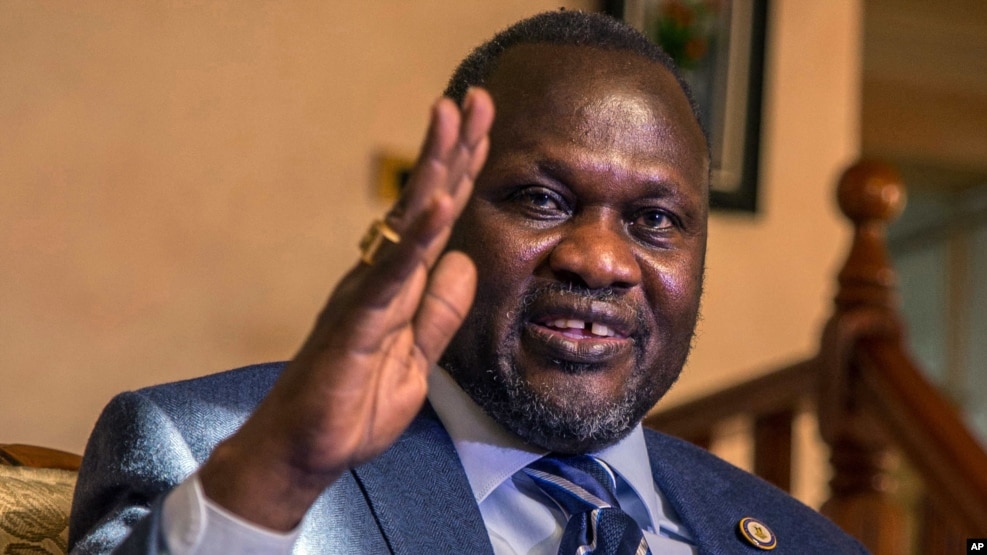
FILE - South Sudan rebel leader Riek Machar talks to reporters in Addis Ababa, Ethiopia, Feb. 13, 2016. Machar fled from Juba in January shortly after heavy fighting broke out in the capital between Machar’s forces and South Sudan army forces.
South Sudan's political opposition has dismissed remarks by U.S. officials urging former First Vice President Riek Machar not to return to South Sudan to reclaim his position, saying the opposition leader's absence is hampering the fragile peace process.
Ambassador Donald Booth, the U.S. special envoy to Sudan and South Sudan, told members of the House of Representatives Foreign Affairs subcommittee Wednesday that Machar, who fled the country in July, should not return to South Sudan because of the continuing instability in the country.
In an interview with VOA after the hearing, Booth said the lack of trust between Machar and South Sudan’s president, Salva Kiir, has created one of the most extreme humanitarian situations in the world.
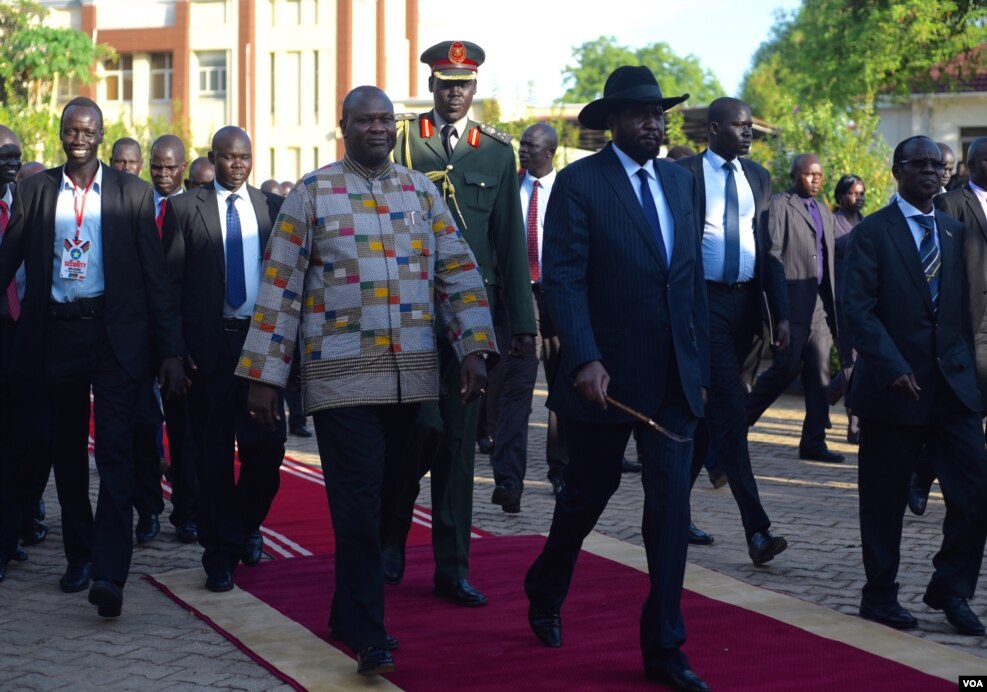
FILE - South Sudanese President Salva Kiir (R) and First Vice President Riek Machar (L) walk together at the presidential palace in Juba on April 26, 2016. (J. Patinkin/VOA)
“It’s clear that [Machar] and Salva Kiir are unable to work together. And if they have their security forces there because they don’t trust each other, those security forces have proven that they can’t coexist in the same town,” said Booth. “So you had the fighting of Juba. We don’t want to see a return to that,” he added.
Reath Muoch Tang, the SPLA/M-in Opposition representative for North America, said he was disappointed by Booth’s remarks, insisting the ambassador’s comments supported the abrogation of the peace agreement.
Muoch also said that Kiir’s appointment of Taban Deng Gai to replace Machar in late July is inconsistent with the peace deal signed over a year ago.
“It seems very complicated now because the government is talking that there is peace in Juba, in which there is no peace in Juba,” said Muoch, who attended the hearing.
“And actually to us, there is no Transitional Government of National Unity because if the peace collapses, if the two partners actually are not working together, there is no government in place,” he said.
Foreigners attacked, lawmakers frustrated
The Associated Press reported that South Sudanese troops raped foreign women, beat and robbed people and killed a local journalist in July in Juba’s Terrain Compound, a venue frequented by foreigners.
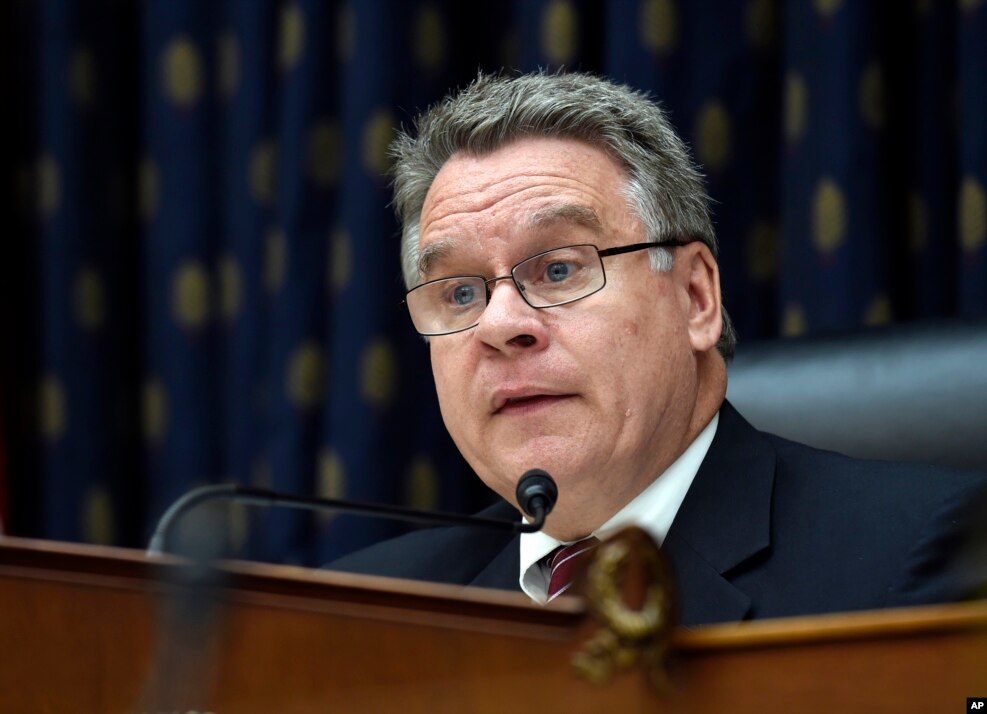
FILE - Congressman Chris Smith.
Rep. Chris Smith (R-NJ), chairman of the House subcommittee on Africa, said one of his constituents was among the foreigners attacked during that incident, which lasted several hours.
The victim from New Jersey had been expected to testify at Wednesday’s hearing but decided not to because she was still traumatized, according to Smith.
Rep. Thomas Rooney (R-Fla.) said he does not believe South Sudan’s leaders can reverse the course of violence in the country and urged Ambassador Booth to immediately implement and arms embargo.
“What can it hurt if the United States does take the lead to say that enough is enough,” he said. “We’ve got diplomatic envoys being shot at; we’ve got all kinds of crimes that we’ve talked about against its own citizenry. We’ve got humanitarian aid and food being seized upon. We’ve got the opposition has fled. We’ve got a government that has lost control of its own military,” said Rooney.
Asked if observers should expect a change in U.S. policy toward South Sudan in light of recent developments, Smith said the shift is already in the process of happening, adding that there are only a few days left for South Sudan to pivot on the side of protection and advocacy for human rights.
Machar the legitimate opposition leader
Calling Machar the “legitimate leader,” Muoch said the former first vice president, who is still recovering from injuries sustained while fleeing the capital Juba shortly after fighting broke out in July, is still in control of the opposition forces.
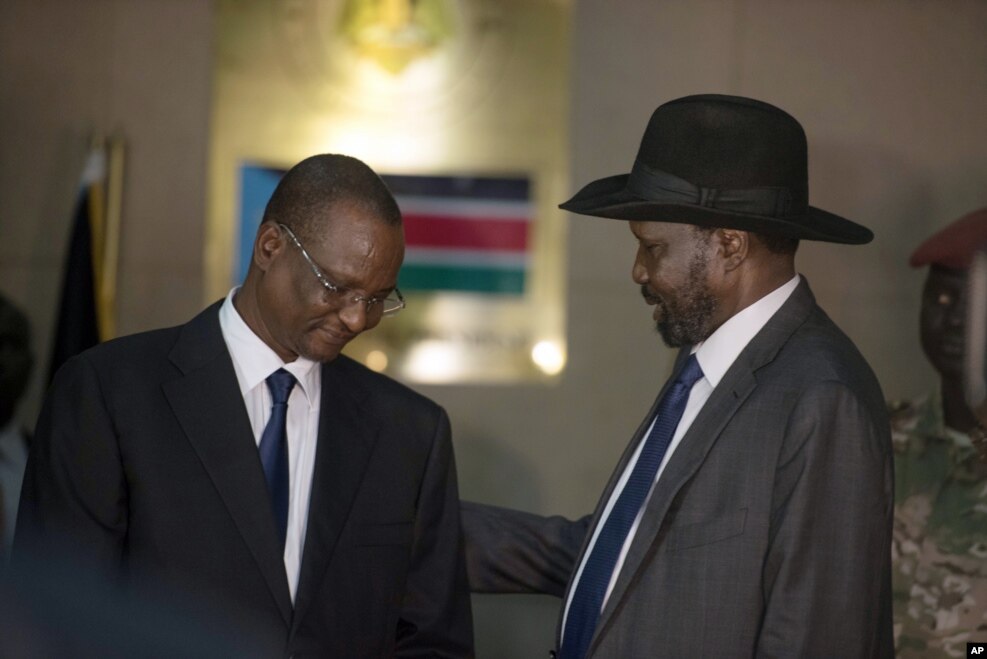
South Sudan's First Vice President Taban Deng Gai, left, speaks with President Salva Kiir, right, after Taban was sworn in, replacing opposition leader Riek Machar, at the presidential palace in Juba, South Sudan, Tuesday, July 26, 2016.
Festus Mogae, chairman of the Joint Monitoring and Evaluation Commission, the body overseeing the peace agreement, told the Associated Press recently that the legitimacy of Taban Deng Gai is “questionable” but diplomats will continue to work with him because they “don’t have an option.”
Brian Adeba, the Associate Director of Policy at the Washington-based Enough Project said more consideration should be placed on the ability of Deng to lead the opposition movement.
“I would reiterate that it is very important to look at Taban Deng Gai himself. Does he have the support of the rank and file of the IO,” said Adeba, who added that it is the determining factor.
Muoch said the majority of the opposition does not support Deng, and sees his appointment as a violation of the peace agreement. “There was no SPLM in Opposition that said to replace Machar, it was only four people,” he said.
“And SPLM-IO we all know we have 270 members of the National Liberation Council and 28 members of the political bureau,” said Muoch.
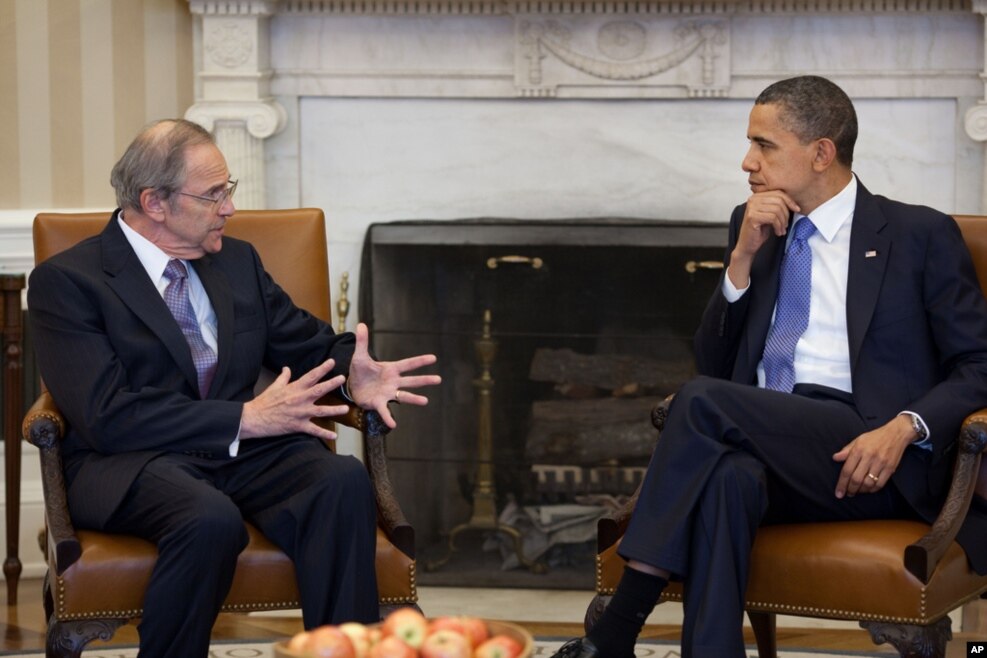
FILE - President Barack Obama meets with Sudan Special Envoy Ambassador Princeton Lyman in the Oval Office, April 1, 2011.
Speaking to VOA after the hearing, Ambassador Princeton Lyman, the former U.S. special envoy to Sudan and South Sudan, said observers should consider a comprehensive approach when considering the role of Machar.
“You have to remember that Ambassador Booth also talked about a more inclusive government and the question is how do you get to a more inclusive government without more of the supporters of Riek Machar, whether he is personally or otherwise is involved in the government,” he said.
Lyman added that it is not clear if the United States will advocate for Machar’s return once the deployment of the rapid protection force enters South Sudan.